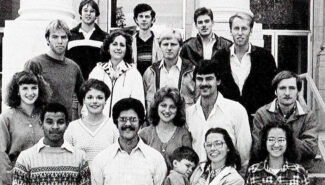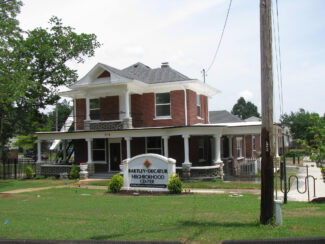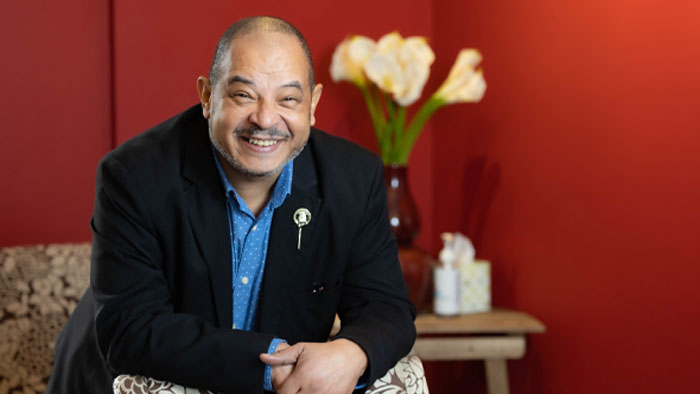Mark Dixon admits he is the man who can’t say no.
Growing up as a minister’s son, he’s always had a desire to help people. That has only grown as he’s gotten older: “I’ve been volunteering in some manner for the past 40 years of my life and loving every minute of it.”
He is an ordained minister and volunteer for countless community groups. He also manages Recovery Outreach Services with his wife Nina Smart-Dixon, who is a substance-use disorder counselor.
“Teaching and preaching, community work and helping people at Recovery Outreach — those are three bright spots in my life.”
“I’ve been a few places, done a few things”
Dixon was raised on a 40-acre farm in Hartville, Missouri.
He came to Missouri State in 1978 to study biology, but soon switched to the psychology program with a religious studies minor. However, life happened — and he didn’t finish his degree until more than 30 years later.

“I planned to be out of here in four years: ‘As soon as I get this degree, I’m heading to seminary out east.’ … It never happened, I never left Springfield!”
The city became his home.
“I know most people go to college and four years later they’re out there changing the world,” Dixon said. “That was not my story. But I got there eventually.”
He held other jobs, including running a nightclub for five years starting when he was 29.
“I’ve been a few places, done a few things. I think that helps me relate to people.”
He is now a minister, trustee and teaching pastor at Deliverance Temple Ministries. It’s a nondenominational Christian church known for a racially diverse congregation.
He’s also been involved with many organizations and initiatives, including:
- School task forces and community committees.
- NAACP.
- Community Partnership of the Ozarks.
- Southwest Missouri Council of Governments.
- Good Community Committee.
Reviving a building important to the Black community
Dixon is also the president and executive director of the Bartley-Decatur Neighborhood Center in north Springfield.
He was instrumental in reviving this older building for a new use.
It has served the African-American community for more than 100 years, and is a stop on the Springfield-Greene County African American Heritage Trail.
It was built in 1900 as a private residence. After that, it was acquired by an organization called the Springfield Colored Hospital Association and became known as the “Negro Clinic.” In World War II, it was a convalescent home for Black veterans.

It was next a community center.
In the 1970s, Roberta Bartley and Olive Decatur — sisters who were both school teachers — started Kiddie Kove Daycare in the building after they retired from teaching. The day care primarily served the needs of Black mothers. The building is now named in their honor.
Following their deaths and closure of the daycare in the 1990s, the building fell into disrepair.
In 2002, Dixon was part of a group who came together to save the structure. The Bartley-Decatur Neighborhood Center organization was officially formed in 2003, on Dixon’s birthday.
“We’re tied together, this building and I,” Dixon said.
It opened as the neighborhood center during Park Day weekend in August 2011. Park Day is a Springfield tradition that started in the 1940s as a reunion and celebration for African-American residents.
Now, the center hosts events and organizations, such as:
- Spanish and English classes.
- Multicultural dance practices.
- Commercial drivers’ license training for minorities.
- Missouri State University department retreats.
- Language and literacy programs.
Bartley-Decatur’s tenant partners include ALAS — the Alliance for Leadership, Advancement and Success, which offers higher education support to the local Hispanic/Latino community — and Grupo Latinoamericano.
“We’ve had a little bit of every kind of thing in here you can imagine. It’s a true community space,” Dixon said. “We’re proud of that.”
Coming back to finish his degree: “All these years, for 10 hours”
For decades, Dixon said, “education has always been a central focus that’s near and dear to my heart.”
That’s why he felt it was ironic he didn’t have his college degree.
When he looked into completing his Missouri State program, he learned he only needed 10 more hours to graduate.
Dixon still remembers tearing up.
“I thought, oh my gosh. All these years, for 10 hours.”
He received his bachelor’s degree in 2010, shortly before his 50th birthday.
Mark exemplifies the pillars of public affairs in life and business
Dixon describes himself as a huge supporter of the university’s public affairs mission.
He believes there’s a lot the university offers the community, and the community offers the university in return.
“Mark exemplifies the pillars of public affairs in life and business,” said Stacey Trewatha-Bach, coordinator of MSU’s office of public affairs support. “He has served as a panelist during two Public Affairs Conferences. We have national and international conference speakers, but Mark was specifically invited for his local perspectives on building community trust, bridging divides and advocating for the power of all voices to be heard.”
Dixon said when people with expertise start a dialogue with those they’re trying to help, magic happens.
“Respect should always go both ways,” he said. “My main goal is to bridge that gap between the people trying to help and the people being helped.”
“Anyone can find important work that can be done right in their backyard. And that’s what happened to me.”
He will probably continue to be the man who doesn’t say no to doing what the community needs.
“One way or another, I’m about helping people,” Dixon said. “I can’t get away from that, though I can’t say I’m trying to. It’s who I am.”


Leave a Reply